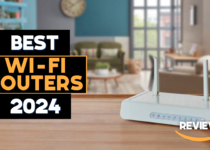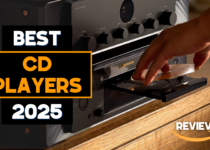TOP 5 BEST DRONES IN 2025
PCMag can help you find the best drones for photography and video, whether you want to add a unique touch to your home videos, vlogs, or real estate content. As a Part 107 remote pilot certified by the FAA, I have evaluated 66 drones (and counting!) in the past ten years, paying particular attention to safety, flight performance, and camera quality. The DJI Mini 4 Pro is my favourite pick for most folks because it’s small and offers great image quality. Click through to each model’s reviews for more information, though, since all of them are worth looking at. Before you take to the skies, make sure to read beyond the list to learn everything you need to know.
Last update on 2025-1-3 / Affiliate links / Images from Amazon.
TOP 5 BEST DRONES IN 2025
1: DJI Mini 4 Pro
- 𝗨𝗻𝗱𝗲𝗿 𝟮𝟰𝟵 𝗴, 𝗡𝗼 𝗥𝗲𝗴𝗶𝘀𝘁𝗿𝗮𝘁𝗶𝗼𝗻 𝗜𝘀 𝗥𝗲𝗾𝘂𝗶𝗿𝗲𝗱[1] – Travel light and skip registration for a user-friendly, easy-to-carry experience on all your journeys. Enjoy the fun of flying without the tedious application process and waiting time.
- For the latest aircraft firmware, 𝘁𝗵𝗲 𝗥𝗲𝗺𝗼𝘁𝗲 𝗜𝗗 𝘄𝗶𝗹𝗹 𝗼𝗻𝗹𝘆 𝗯𝗲 𝗮𝗰𝘁𝗶𝘃𝗮𝘁𝗲𝗱 𝘄𝗵𝗲𝗻 𝘁𝗵𝗲 𝗜𝗻𝘁𝗲𝗹𝗹𝗶𝗴𝗲𝗻𝘁 𝗙𝗹𝗶𝗴𝗵𝘁 𝗕𝗮𝘁𝘁𝗲𝗿𝘆 𝗣𝗹𝘂𝘀 𝗶𝘀 𝘂𝘀𝗲𝗱. If your drone needs to be registered, such as 𝗳𝗹𝗶𝗴𝗵𝘁𝘀 𝗳𝗼𝗿 𝗰𝗼𝗺𝗺𝗲𝗿𝗰𝗶𝗮𝗹 𝗽𝘂𝗿𝗽𝗼𝘀𝗲𝘀, 𝗽𝗹𝗲𝗮𝘀𝗲 𝗳𝗹𝘆 𝘄𝗶𝘁𝗵 𝘁𝗵𝗲 𝗜𝗻𝘁𝗲𝗹𝗹𝗶𝗴𝗲𝗻𝘁 𝗙𝗹𝗶𝗴𝗵𝘁 𝗕𝗮𝘁𝘁𝗲𝗿𝘆 𝗣𝗹𝘂𝘀.
- 𝗨𝗻𝗹𝗲𝗮𝘀𝗵 𝗦𝘁𝘂𝗻𝗻𝗶𝗻𝗴 𝗩𝗲𝗿𝘁𝗶𝗰𝗮𝗹 𝗩𝗶𝗱𝗲𝗼𝘀 𝗶𝗻 𝟰𝗞/𝟲𝟬𝗳𝗽𝘀 𝗛𝗗𝗥 – Perfectly showcases sunrise, sunset, and night scenes with impressive clarity. Share videos instantly without the need for post-cutting. Enjoy high-quality footage straight out of the camera.
- 𝗢𝗺𝗻𝗶𝗱𝗶𝗿𝗲𝗰𝘁𝗶𝗼𝗻𝗮𝗹 𝗢𝗯𝘀𝘁𝗮𝗰𝗹𝗲 𝗦𝗲𝗻𝘀𝗶𝗻𝗴 𝗳𝗼𝗿 𝗘𝗻𝗵𝗮𝗻𝗰𝗲𝗱 𝗦𝗮𝗳𝗲𝘁𝘆 – With precise detection capabilities in all directions, you can fly with confidence, knowing that the drone will better detect obstacles. Worry less about collisions when flying, even first-time users.
- 𝗨𝗻𝗶𝗻𝘁𝗲𝗿𝗿𝘂𝗽𝘁𝗲𝗱 𝗙𝗹𝗶𝗴𝗵𝘁𝘀 𝘄𝗶𝘁𝗵 𝗘𝘅𝘁𝗲𝗻𝗱𝗲𝗱 𝗕𝗮𝘁𝘁𝗲𝗿𝘆 𝗟𝗶𝗳𝗲 – Experience extended battery life for uninterrupted, longer flights[3]. Say goodbye to battery anxiety, let nothing hold you back as you explore vast landscapes.
Last update on 2025-1-3 / Affiliate links / Images from Amazon.
The most powerful and lightweight drone available is the DJI Mini 4 Pro. You don’t need to register it with the FAA because it only weights 249g with its basic battery, which allows for about 34 minutes of flight time. However, the extended life battery, which extends flights beyond 45 minutes, is the better choice for those who don’t mind paperwork and taxes. Automated flight modes, a Quad Bayer camera with 4K60 HDR footage, and full 360-degree obstacle avoidance complete the feature set. The APAS feature, which enables the drone to navigate through intricate areas independently, even at low altitudes, is very appealing to us.
The Mini 4 Pro is a logical upgrade if you liked the Mini 3 but wanted a little more. The Mini 4 Pro should be a good upgrade for drone aficionados, cinematographers wishing to add a B-camera for aerials, and developers willing to pay a little bit more for clever obstacle avoidance. Additionally, because it enables vertical 9:16 videos, it’s an excellent fit for TikTok influencers.
Pros
- Small, portable design
- Two remote control options
- Supports vertical video and upward camera tilt
- 4K60 video in SDR, HDR, or D-Log M
- 249g takeoff weight sidesteps registration requirements
Cons
- Doesn’t include AirSense transponder
- Extended battery option puts it above registration weight limit
2: DJI Air 3
- 𝗖𝗮𝗽𝘁𝘂𝗿𝗲 𝗕𝗿𝗲𝗮𝘁𝗵𝘁𝗮𝗸𝗶𝗻𝗴, 𝗜𝗺𝗺𝗲𝗿𝘀𝗶𝘃𝗲 𝗦𝗵𝗼𝘁𝘀 – DJI Air 3’s dual cameras offer creative focal-length options ideal for travel photography. Show off stunning environments and tell captivating stories through your lens.
- 𝗙𝗔𝗔 𝗥𝗲𝗺𝗼𝘁𝗲 𝗜𝗗 𝗖𝗼𝗺𝗽𝗹𝗶𝗮𝗻𝘁 – DJI Air 3 complies with the FAA Remote ID rule. Please check the compliance document below to see the user guide for Remote ID, and you can visit the FAA’s website for requirements of drone registration and Remote ID.
- 𝗘𝗻𝗵𝗮𝗻𝗰𝗲𝗱 𝗦𝗮𝗳𝗲𝘁𝘆, 𝗪𝗼𝗿𝗿𝘆-𝗙𝗿𝗲𝗲 𝗙𝗹𝘆𝗶𝗻𝗴 – Fly confidently with Air 3’s 𝗼𝗺𝗻𝗶𝗱𝗶𝗿𝗲𝗰𝘁𝗶𝗼𝗻𝗮𝗹 𝗼𝗯𝘀𝘁𝗮𝗰𝗹𝗲 𝘀𝗲𝗻𝘀𝗶𝗻𝗴. It ensures comprehensive protection even in challenging environments like forests.
- 𝗦𝘁𝘂𝗻𝗻𝗶𝗻𝗴 𝟰𝟴𝗠𝗣 𝗜𝗺𝗮𝗴𝗲𝘀 𝗳𝗼𝗿 𝗛𝗶𝗴𝗵-𝗤𝘂𝗮𝗹𝗶𝘁𝘆 𝗖𝗿𝗼𝗽𝘀 – Air 3 captures impressive 48MP images, allowing for remarkable crops. Even quickly snapped travel photos can be cropped to reveal surprising details.
- 𝗜𝗺𝗺𝗲𝗿𝘀𝗶𝘃𝗲 𝗙𝗼𝗼𝘁𝗮𝗴𝗲 𝘄𝗶𝘁𝗵 𝗥𝗶𝗰𝗵 𝗗𝗲𝘁𝗮𝗶𝗹𝘀 – Record stunning 4K/60fps HDR videos with the dual cameras. Experience breathtaking visuals with vibrant colors and lifelike details.
Last update on 2025-1-3 / Affiliate links / Images from Amazon.
The DJI Air 3 gives pilots a lot of creative possibilities by equipping its gimbal-stabilized camera with both a 70mm mid-telephoto and a 24mm wide-angle lens. Its 360-degree object avoidance system makes the drone virtually crash-proof for manual flying and improves automatic camera movements and follow-me flights. The package is completed with a long battery life, crisp 4K video, and high-quality still images.
The Air 3 is the ideal drone to purchase if you feel that the DJI Mini 4 Pro’s single camera is too restrictive but you don’t want to shell out a lot of cash for the Mavic 3 Pro. The second camera is the primary reason to upgrade, as its image quality is comparable to that of the Mini 4 Pro’s primary camera.
Pros
- Wide-angle and mid-telephoto camera stack
- Long battery life
- Hyperlapse, slow-motion, and waypoint flight features
- All-around obstacle avoidance
- Gimbal-stabilized cameras with 60-degree upward tilt
- Sharp 4K footage with standard, flat, or HDR color profiles
Cons
- Fixed-aperture lenses
- Meager 8GB of internal storage
- Requires FAA registration
3: DJI Mavic 3 Pro
- Hasselblad Main Camera – Mavic 3 Pro has a 4/3 CMOS sensor, 24mm format equivalent, f/2.8-f/11, 20 MP. The Hasselblad 4K drone camera supports shooting RAW photos with a dynamic range of up to 12.8 stops.
- FAA Remote ID Compliant – DJI Mavic 3 Pro complies with the FAA Remote ID rule. Please check the compliance document below to see the user guide for Remote ID, and you can visit the FAA’s website for requirements of drone registration and Remote ID.
- Omnidirectional Obstacle Sensing and APAS 5.0 – Mavic 3 Pro ensures you fly safely and create with peace of mind. Eight vision sensors work with a vision computing engine to sense obstacles.
- 43-minute max flight time – Mavic 3 Pro gives you more confidence to fly further and spend less time worrying about the battery level of the long-range drone with camera for adults.
- DJI O3+ – Mavic 3 Pro features a transmission distance of up to 15 km with stable signals, presenting a more coherent camera view A professional 4K camera long-range drone for adults.
Last update on 2025-1-3 / Affiliate links / Images from Amazon.
With its large Four Thirds format sensor and Hasselblad colour profile, the DJI Mavic 3 Pro produces class-leading stills and video right out of the camera. The drone’s integrated GPS keeps it steady in the air, its all-around obstacle sensors make it easy to avoid obstacles, and its 35-minute flying time (in testing) makes flights safer. While anyone on a budget can choose the $1,599 Classic edition, which does away with the telephoto cameras and internal storage, film producers can upgrade to the Pro Cine ($4,799) edition, which comes with a 1TB SSD, ProRes 422 video capability, and the RC Pro remote.
Vloggers, independent filmmakers, cinematographers, and other creative professionals will love the Mavic 3 Pro. Although you need an operator’s licence to use it for paid jobs and it’s hefty enough to require FAA registration, it’s still portable for location work.
Pros
- Stabilized, triple-camera array
- Includes a companion app and a remote with a built-in screen
- All-around obstacle sensors
- Up to 5.1K30 or 4K120 video
- Midrange 3x lens shows excellent picture quality
- Wide-angle Four Thirds camera with Hasselblad color
Cons
- Base model has just 8GB of onboard storage
- Only the pricey Cine model supports ProRes
- Falls shy of promised 43-minute flight time
4: DJI Mini 3
- No Registration Needed – Under 249 g, FAA Registration, and Remote ID are not required if you fly for recreational purposes. Visit the FAA’s official website for requirements related to drone registration and Remote ID. [1]
- 4K UHD Stunning Imagery- Film in 4K HDR Video for crystal clear aerial shots. With Dual Native ISO Fusion, Mini 3 enables the capture of details in highlights and shadows, both day and night. [3]
- Striking Vertical Videos are Ready to Share – With True Vertical Shooting, you can easily capture tall landmarks like skyscrapers and waterfalls. And after capturing, it’s in the perfect orientation to post to Instagram or TikTok.
- Extended Battery Life – Its flight time can be extended up to 51 minutes with the Intelligent Flight Battery Plus (sold separately), but the aircraft will weigh more than 249 g. Fly More combo offers up to 114 minutes of total flight time. [2]
- 38kph (Level 5) Wind Resistant and 3-Axis Gimbal for Stable – With its Level 5 wind resistant and 3-axis mechanical gimbal, Mini 3 can capture consistently smooth 4K imagery. rushless motors enhance power and allow takeoff at altitudes up to 4,000 meters.
Last update on 2025-1-3 / Affiliate links / Images from Amazon.
Pilots who are dissatisfied with the beginning camera on the reasonably priced DJI Mini 2 but are unable to fully justify the Mini 4 Pro can choose the DJI Mini 3. The camera’s features include 60 degrees of upward tilt and compatibility for 4K30 footage with an HDR look in either vertical or landscape configuration. Additionally, the photo quality is good. The F1.7 lenses perform well at daylight and twilight, and the camera can capture 12MP JPG or Raw DNG images. GPS, Find My Drone, and Return to Home are examples of safety features. Because of its 249g takeoff weight, you may fly it without having to register with the FAA; all you have to do is complete an online knowledge exam. Although we wish DJI had included obstacle recognition in this model, we still appreciate the 38-minute flight durations.
This drone is a good option for creators looking for a dual-aspect drone for YouTube and TikTok. It can easily record live video directly to a smartphone app, capture still images, and maintain stability even while flying close to the 400-foot altitude restriction. The Mini 2 is the greatest substitute if you don’t want to spend as much ($560 with a remote). The Mini 4 Pro, on the other hand, has helpful obstacle avoidance sensors if you can afford them.
Pros
- Good-looking 4K30 video
- Built-in GPS and FlySafe safety features
- 249g build for registration-free flight
- 51-minute extended battery available
- 38-minute flights with standard battery
- 12MP stills in Raw DNG or JPG
- Support for vertical video and upward gimbal tilt
Cons
- Omits obstacle detection
- Doesn’t support Hyperlapse or ActiveTrack
- Limited to one color profile
5: Autel Robotics Evo Lite+
- 👍【2025 NEWEST LITE PLUS FLY MORE COMBO】Autel EVO lite plus drone is designed for professionals. EVO Lite+ features adjustable f/2.8 to f/11 aperture, three-way Obstacle Avoidance, 6K/30p Video, 2.7K/30fps live view transmission range of 7.4 Miles, and a maximum 40-Min flight time. Autel EVO lite+ with an intelligent moonlight algorithm can capture crisp, vibrant details at night with low noise — even when the ISO is cranked up high. It will be the best choice for your flight!
- 👍【1″ CMOS SENSOR WITH 20MP CAMERA】Autel lite+ aircraft with a 1-inch sensor, a 20MP camera and a large 2.4μm pixels: Takes photos with a resolution of up to 5472 x 3648, and records 6K video at 30 fps or 4K video at 60 fps. It has the ability to rebalance overexposure or underexposure to allow natural colors to really shine through. When the camera is in Ultra Vision, Night Scene Mode, the aperture, zoom, and focus capabilities are better than those of Air 2s.
- 👍【ADJUSTABLE APERTURE FROM F/2.8-F/11】Autel lite plus foldable drone has the same adjustable aperture as the Autel EVO 2 Pro and Mavic 2 Pro. Flex your creativity with an adjustable aperture from f/2.8-f/11, giving you the ability to alter exposure and depth of field in imaginative ways that show off your unique artistic style.
- 👍【EASY TO USE – ONE CLICK VLOG】 Autel lite+ quadcopter create dramatic, professional-level shots at the touch of a button with four (Flick, Rocket, Fade away, Orbit) automatic shooting modes. Add a soundtrack and filters in the Autel Sky app to make your video even more epic, allowing you to produce unforgettable results whether you’re a veteran pilot or completely new to the drone game.
- 👍【FLY SAFE WITH 3-WAY OBSTACLE AVOIDANCE】Autel EVO Lite+ 6K drone is not commonly seen in drones of this size, it incorporates an advanced obstacle avoidance system to keep it safe while flying. With 3-way binocular vision sensors that enable the drone to perceive obstructions in front of it, behind it, and below it. If anything comes into the Lite+’s path, it will automatically brake and hover to avoid a collision.
Last update on 2025-1-3 / Affiliate links / Images from Amazon.
Despite having three-way obstacle detection for safer flight, the Autel Robotics Evo Nano+ weighs only 249g, so you don’t need to register it with the FAA. A steady camera captures crisp images at up to 50MP and records 4K30 video. At roughly 28 minutes, the battery life is also excellent.
For pilots who prefer a quadcopter that they can fly without built-in geofencing limitations, such as the DJI FlySafe system, which some find restricting, the Evo Nano+ is a suitable choice. The picture quality is excellent, with aggressive sharpening being the only knock, and the 249g takeoff weight gives you a little more freedom to utilise it than heavier drones. A decent drone for beginners is the Nano+.
Pros
- 4K30 video with gimbal stabilization
- GPS with return-to-home functionality
- Three-way obstacle sensors
- Up to 28 minutes of flight time
- Automated quick shots and Hyperlapse
- Camera supports 12MP and 50MP photos
Cons
- Raw photos are tricky to process
- Log profile is only 8-bit
- Overprocessed look to video
What to Look for When Buying a Best Drones in 2025
When buying the best drone in 2025, consider these essential factors to ensure you choose a device that meets your needs, whether for photography, videography, or recreational use:
1. Purpose of Use
- Photography/Videography: Look for drones with high-resolution cameras, stabilization, and advanced features like HDR and RAW support.
- Racing Drones: Prioritize speed, agility, and durability.
- Recreational Use: Lightweight, beginner-friendly models with basic controls and safety features.
2. Camera Specifications
Resolution:
- At least 4K video resolution for high-quality footage; 6K or 8K for professional use.
Stabilization:
- 3-Axis Gimbal Stabilization ensures smooth video footage.
Frame Rates:
- 60 fps or higher for cinematic video; 120 fps or more for slow-motion shots.
Zoom Capability:
- Optical zoom for better quality; digital zoom for convenience.
3. Flight Performance
Battery Life:
- Look for drones with 20–45 minutes of flight time per charge.
Range:
- Drones with a range of 5–10 km or more are ideal for capturing distant scenes.
Speed:
- High-speed drones (30–50 mph) are ideal for racing or capturing fast-moving subjects.
4. Portability
- Foldable Design: Compact and easy to carry for travel.
- Weight: Lightweight models under 250g may not require registration in many regions.
5. Intelligent Flight Modes
- Follow Me: Automatically tracks and follows a subject.
- Waypoint Navigation: Pre-programmed flight paths for autonomous operation.
- Orbit Mode: Circles around a point of interest for cinematic shots.
- Obstacle Avoidance: Advanced sensors to prevent collisions.
6. Build Quality and Durability
- Materials: Strong and lightweight materials like carbon fiber or ABS plastic.
- Weather Resistance: Drones with IP ratings are better suited for varying weather conditions.
7. Safety Features
- Return to Home (RTH): Automatically returns the drone to its launch point when the battery is low or signal is lost.
- Geofencing: Restricts the drone from entering restricted or hazardous areas.
- Obstacle Sensors: Front, rear, and downward sensors for enhanced safety.
8. Ease of Use
- Beginner Modes: Slower speeds and simplified controls for new pilots.
- Controller Design: Ergonomic and intuitive with smartphone compatibility.
- App Integration: User-friendly apps with features like live feed, flight telemetry, and editing tools.
9. Regulatory Compliance
- Registration Requirements: Check if the drone needs to be registered with local aviation authorities.
- Flight Restrictions: Ensure compatibility with regulations like height limits and restricted zones.
10. Connectivity and Signal Quality
- Transmission System: Drones with OcuSync or Lightbridge offer better range and stability.
- Live Video Feed: Low-latency streaming with resolutions up to 1080p.
11. Storage Options
- Internal Storage: Useful for quick operation; typically 8–32GB.
- Expandable Storage: Support for microSD cards up to 256GB or more.
12. Accessories and Upgradability
- Extra Batteries: For extended flight sessions.
- Propeller Guards: For added safety.
- Carrying Case: Protects your drone during transport.
13. Price Range
- Budget Drones ($100–$300): Basic features for beginners.
- Mid-Range Drones ($300–$1,000): Advanced cameras and intelligent flight modes.
- High-End Drones ($1,000+): Professional-grade features for serious enthusiasts or filmmakers.
14. Brand and Warranty
- Reputable Brands: DJI, Autel Robotics, Skydio, Parrot, and Holy Stone.
- Warranty: Look for at least 1 year of coverage and responsive customer support.
15. Future-Proof Features
- AI Integration: Advanced subject tracking and editing tools.
- Autonomous Capabilities: Improved obstacle detection and navigation.
- Modular Design: Swappable cameras or sensors for varied use cases.







